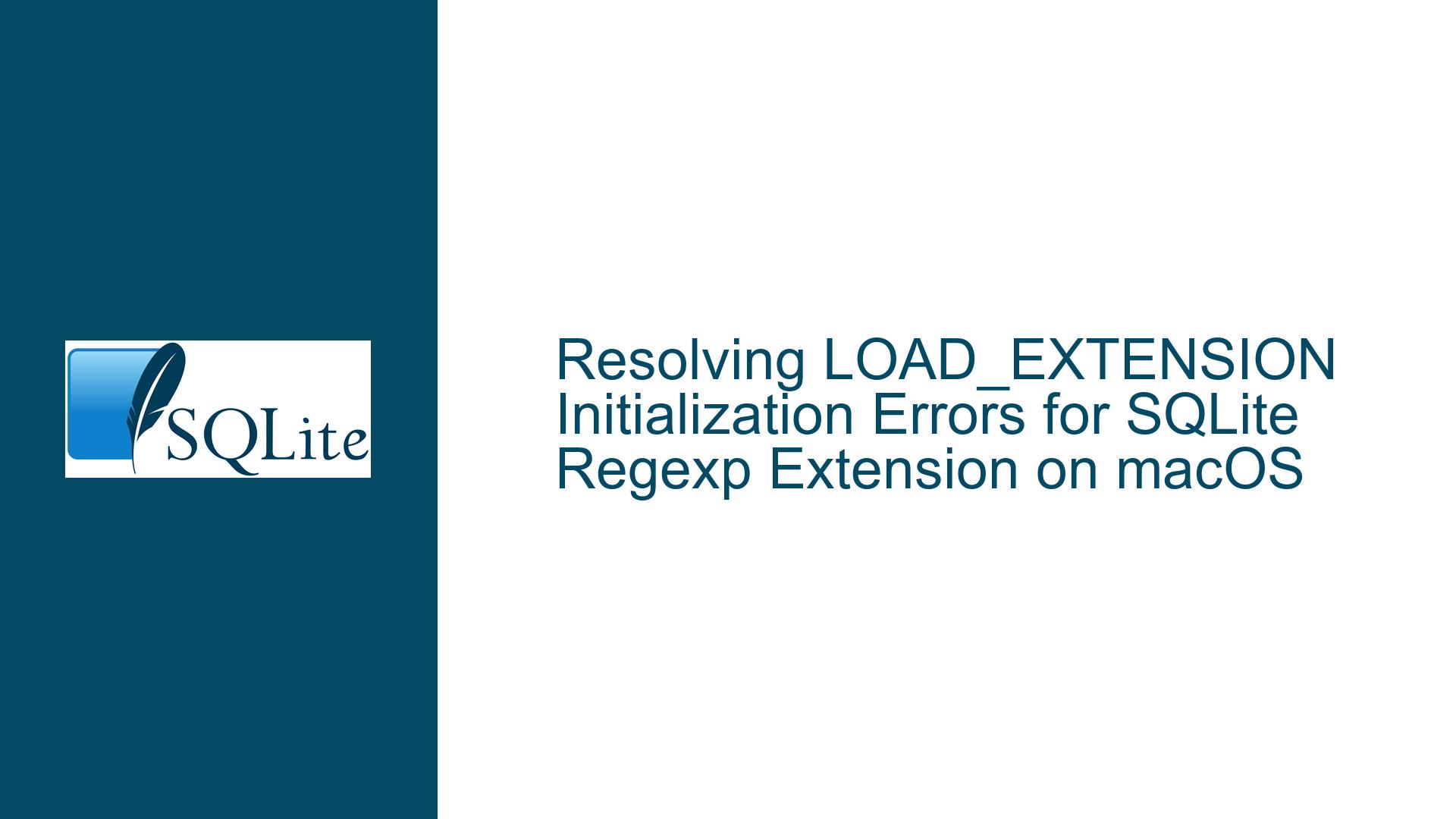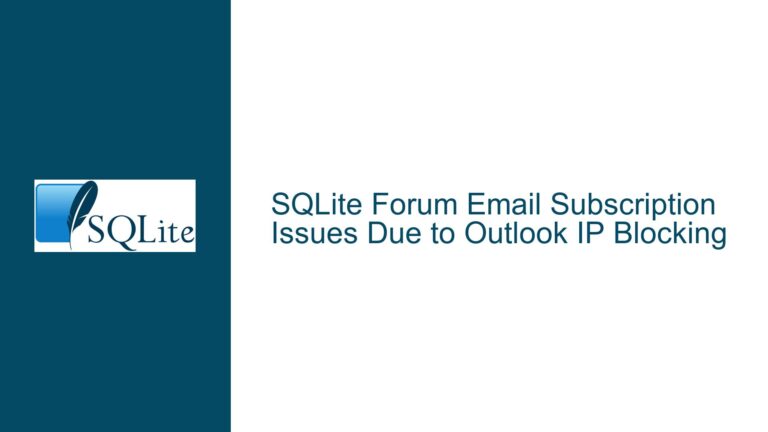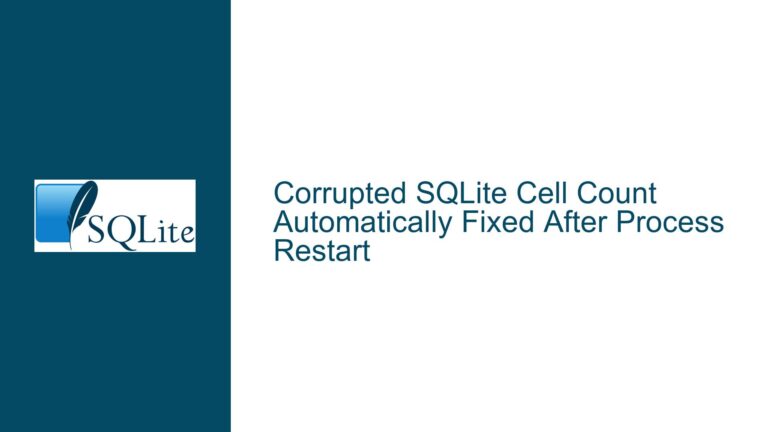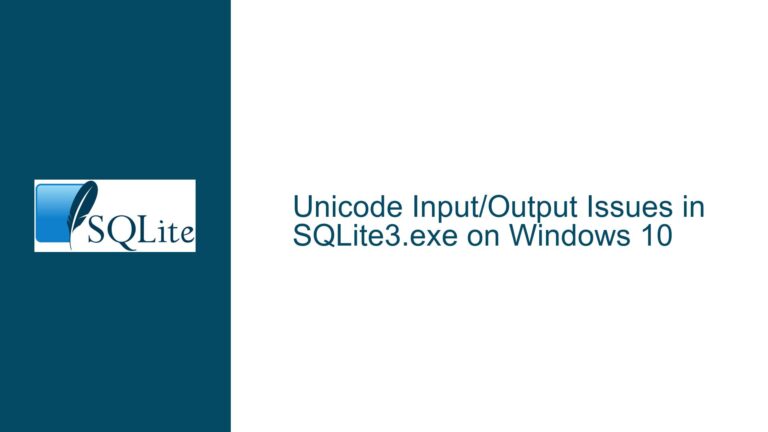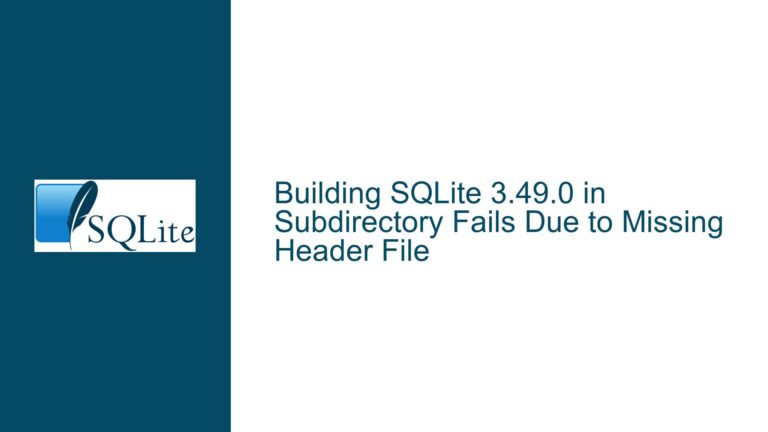Resolving LOAD_EXTENSION Initialization Errors for SQLite Regexp Extension on macOS
Extension Initialization Failure in SQLite: Regexp Module Compilation & Runtime Challenges
Compilation Misconfiguration, Runtime Environment Constraints, and Security Restrictions
The core issue involves a failure to initialize a SQLite extension (specifically the regexp module) after compiling it as a dynamic library on macOS. The error manifests as a generic "error during initialization" message when attempting to load the extension via the LOAD_EXTENSION() SQL function or the .load command in the SQLite shell. This problem arises from a combination of factors related to compilation parameters, runtime environment configuration, and SQLite’s security policies.
Incomplete Compilation Flags, Incorrect Library Paths, and Disabled Extension Loading
1. Compilation Misconfiguration
SQLite extensions require precise compiler flags to ensure compatibility with the SQLite core library. The absence of critical flags such as -shared or -DSQLITE_EXTENSION_INIT1 can prevent the extension from initializing correctly. Additionally, macOS-specific compilation requirements (e.g., -dynamiclib vs. -shared) and architecture mismatches (x86_64 vs. ARM64) often lead to silently miscompiled binaries.
2. Runtime Library Search Path Errors
The LD_LIBRARY_PATH environment variable is not the default library search path on macOS. The operating system uses DYLD_LIBRARY_PATH instead. Failing to set this variable or incorrectly specifying the library path in the SQLite shell results in the extension being undiscoverable at runtime.
3. SQLite Security Restrictions
SQLite disables extension loading by default for security reasons. The SQLITE_DBCONFIG_ENABLE_LOAD_EXTENSION flag must be explicitly enabled at runtime, either through the SQLite shell’s .load command or via programmatic API calls. Furthermore, the SQLite binary itself must have been compiled with the SQLITE_ENABLE_LOAD_EXTENSION option, which is not always the case with precompiled binaries distributed via package managers.
Validating Compilation Parameters, Configuring Runtime Paths, and Enabling Extension Permissions
Step 1: Verify Compilation Flags and Entry Point
SQLite extensions must export a well-defined entry point function (e.g., sqlite3_regexp_init). The compiler must generate position-independent code (-fPIC) and link against the SQLite core library. For macOS, the correct compilation command is:
gcc -I/usr/local/opt/sqlite/include -fPIC -dynamiclib /tmp/regexp.c -o /usr/local/opt/sqlite/lib/regexp.dylib -lsqlite3
The -lsqlite3 flag ensures linkage against the SQLite library, resolving potential undefined symbol errors during initialization.
Step 2: Set macOS-Specific Library Paths
Replace LD_LIBRARY_PATH with DYLD_LIBRARY_PATH when running the SQLite shell:
DYLD_LIBRARY_PATH=/usr/local/opt/sqlite/lib sqlite3
This directs the dynamic linker to search the specified directory for regexp.dylib.
Step 3: Enable Extension Loading in SQLite
Within the SQLite shell, use the .load command instead of LOAD_EXTENSION(), as it implicitly enables extension loading:
.load /usr/local/opt/sqlite/lib/regexp.dylib
If programmatic loading is required, enable the extension flag via the SQLite API:
sqlite3_db_config(db, SQLITE_DBCONFIG_ENABLE_LOAD_EXTENSION, 1, NULL);
Step 4: Inspect the Compiled Binary
Use macOS’s otool utility to verify dependencies and architecture compatibility:
otool -L /usr/local/opt/sqlite/lib/regexp.dylib
Ensure the output includes libsqlite3.dylib with a valid path and that the architectures match your system (e.g., x86_64 or arm64).
Step 5: Check SQLite Binary Compatibility
Confirm that the sqlite3 binary supports extension loading:
sqlite> .dbconfig enable_load_extension
If the command is unrecognized or returns 0, recompile SQLite from source with -DSQLITE_ENABLE_LOAD_EXTENSION.
Step 6: Debug Initialization Errors
Enable SQLite’s error logging by registering a custom log handler before loading the extension:
sqlite3_config(SQLITE_CONFIG_LOG, errorLogCallback, NULL);
This can reveal detailed error messages about missing symbols or initialization failures.
Step 7: Validate Extension Functionality
After successful loading, verify the REGEXP operator is available:
SELECT 'abc' REGEXP '^a';
A return value of 1 confirms the extension is operational.
Final Fix: Comprehensive Example
- Recompile with corrected flags:
gcc -I/usr/local/opt/sqlite/include -fPIC -dynamiclib /tmp/regexp.c -o /usr/local/opt/sqlite/lib/regexp.dylib -lsqlite3
- Launch SQLite with proper environment:
DYLD_LIBRARY_PATH=/usr/local/opt/sqlite/lib sqlite3
- Load the extension:
.load /usr/local/opt/sqlite/lib/regexp.dylib
By methodically addressing compilation, environment, and security factors, the regexp extension initializes correctly, enabling regular expression support in SQLite on macOS.
